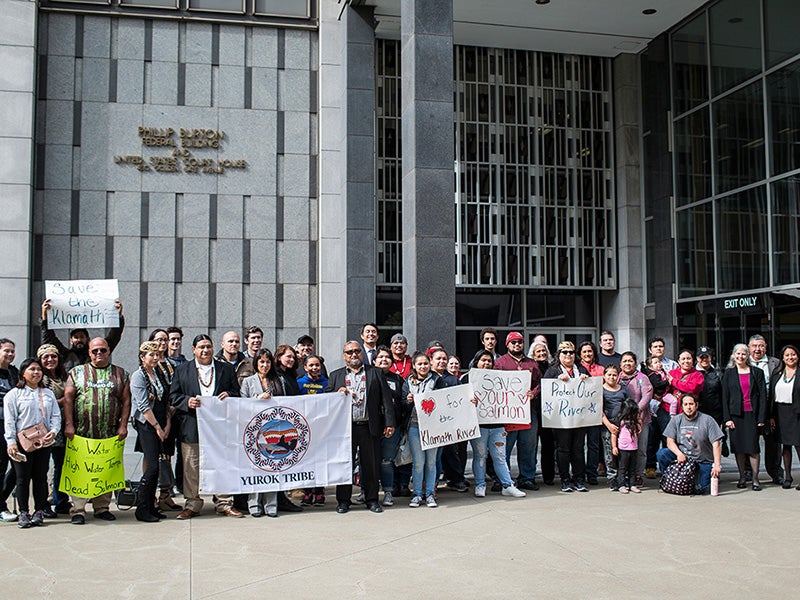Yurok Tribe and Commercial Fishing Families Secure More Water for Klamath River Salmon
Bureau of Reclamation develops new three-year operations plan
Contact
The Yurok Tribe, the Pacific Coast Federation of Fishermen’s Associations (PCFFA), and the Institute for Fisheries Resources (IFR), represented by the nonprofit environmental law firm Earthjustice, have successfully obtained a new three-year plan from the Bureau of Reclamation (Reclamation) for operating the Klamath Irrigation Project to increase springtime flows in the Klamath River. The Tribe and commercial fishing groups filed litigation in 2019 to protect threatened salmon and avoid more closures of valuable salmon fisheries in most water years. This course correction, securing more water to sustain salmon and mitigate disease outbreaks, is the outcome of the decision to bring the matter to court.
Klamath River salmon are integral to the Tribe’s sustenance and way of life. Under the 2019–2024 Klamath Project Operations Plan, which the Tribe had no opportunity to help craft, the Klamath fishery experienced a disease outbreak and degraded habitat due to artificial drought conditions created by the Plan. Because of “weak stock management” constraints, the health of Klamath River salmon stocks also determines whether ocean coastal commercial Chinook fisheries are open or closed, affecting coastal communities across a large portion of the West Coast. The Bureau of Reclamation had crafted an operations plan using erroneous data, which was severely flawed and allocated far too little water to provide essential habitat for both species of young salmon in the Klamath River.
The Tribe and commercial fishing families filed litigation to secure adequate water flows necessary to prevent further collapse of Klamath salmon populations, which were lacking in Reclamation’s 2019–2024 water operations plan. The situation on the Klamath River is critical and deteriorating rapidly. In 2019, Tribal members suffered from an absence of an expected salmon return, and coastal salmon fishing-dependent families were also economically harmed by repeated ocean fishing closures. As a result of the litigation, Reclamation has now developed a new three-year operations plan that allocates more water for river flows in most hydrologic years to help the salmon. Reclamation has also agreed to develop a longer-term operations plan through a collaborative process with the Tribe. In return, the Tribe and commercial fishing groups have withdrawn their motion for a preliminary injunction and stayed their lawsuit subject to implementation of the three-year plan.
“It’s disappointing that the Yurok Tribe has to file litigation to get a seat at the table and the water we need for a healthy river. We will always stand up and fight for our river and our people, because salmon are our lifeline. Our salmon and Yurok people have suffered from mismanagement of the river, low flows, and devastating disease outbreaks, and time is running out,” said Yurok Tribe Vice-Chairman Frankie Myers.
“Litigation was the only alternative, because the salmon and the people who depend on them were facing a crisis,” said Patti Goldman, Earthjustice managing attorney. “This led Reclamation to devote more water for the river and salmon and be more collaborative in developing the next long-term operations plan.”
“We needed to bring this lawsuit and it succeeded in helping salmon in the short-term. Now we can turn to working together on longer-term river restoration,” said Glen Spain, NW Regional Director of both PCFFA and IFR. “Protecting and ultimately restoring the once-great salmon runs of the Klamath River, once the third largest in the continental U.S., benefits everyone.”
Martin do Nascimento / Earthjustice
Yurok Tribal members explain what the Klamath River and its salmon mean to them, as they rallied outside the federal court hearing in San Francisco on Apr. 11, 2018.
Background
All fish runs in the Klamath River have suffered significant declines in recent years, which affects tribal and commercial fishermen on the Klamath River and across the West Coast. For example, Klamath River coho salmon are listed as a threatened species under the federal Endangered Species Act. Efforts to protect threatened coho and low chinook salmon stocks have resulted in major shutdowns of in-river and much more abundant coastal chinook salmon fisheries generally. These fish runs are central to the cultural identity and survival of the Yurok Tribe and also important to commercial fishing families who rely on the Klamath River, which is California’s second-largest producer of salmon and the third largest in the continental U.S.
In February 2017, U.S. District Judge William H. Orrick ordered federal agencies to come up with a new plan for the river and to immediately take steps to protect juvenile coho salmon after several years of high mortalities of juvenile salmon brought on by low flows in the Klamath River. The Bureau of Reclamation adopted a new plan, but in 2019, the first year of the new plan, despite above-average water abundance, river flows were kept at near drought levels and yet another fish disease outbreak occurred. The Yurok Tribe and commercial fishing families were forced to go back to court seeking more water to prevent a repeat of last year. For more, read the case overview and watch Earthjustice’s original video, “Reclaiming the Klamath.”

Additional Resources
About Earthjustice
Earthjustice is the premier nonprofit environmental law organization. We wield the power of law and the strength of partnership to protect people's health, to preserve magnificent places and wildlife, to advance clean energy, and to combat climate change. We are here because the earth needs a good lawyer.